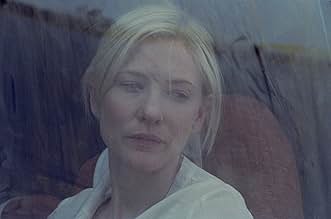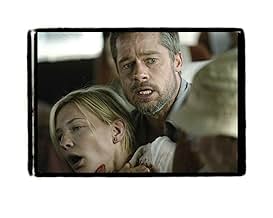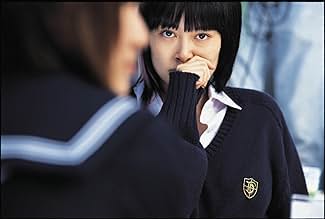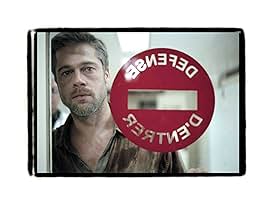La tragédie frappe un couple marié en vacances dans le désert marocain, donnant ainsi naissance à une histoire où s'entremêle le destin de quatre familles éloignées.La tragédie frappe un couple marié en vacances dans le désert marocain, donnant ainsi naissance à une histoire où s'entremêle le destin de quatre familles éloignées.La tragédie frappe un couple marié en vacances dans le désert marocain, donnant ainsi naissance à une histoire où s'entremêle le destin de quatre familles éloignées.
- A remporté 1 oscar
- 45 victoires et 137 nominations au total
Histoire
Le saviez-vous
- AnecdotesThe scene where Chieko (Rinko Kikuchi) and her father are in the car together was shot without filming permission from the city due to slow Japanese bureaucratic procedures. The crew created "man-made" busy traffic, and began shooting the scene. Later the police started chasing them while still shooting the scene.
- GaffesAfter the wedding, Amelia, her nephew and the Jones children use the Tecate border crossing to reenter the USA. After fleeing, we are shown a sandy, wide desert where they wander. Actually, the Tecate border crossing is in the mountains, there is no such desert within a reasonable distance on the USA side. What is shown looks like an Arizona border crossing.
- Citations
Mike Jones: My mom said Mexico is dangerous.
Santiago: [in Spanish] Yes, it's full of Mexicans.
- Bandes originalesPara Que Regreses
El Chapo
Gabriel Ramirez
Maximo Aguirre Music Publishing, Inc.
D Disa Latin Music, S. de R.L. de C.V
Commentaire en vedette
Alejandro González Iñárritu's two previous films, Amores Perros and 21 Grams, dealt with the subject of very different people being connected on a small scale. Babel takes a different approach, but has the same central theme. The plot follows four different stories that stretch the entire globe (Morocco, Japan, Mexico and a few minutes in America) and shows how one single bullet can effect the lives of people so far apart. Guillermo Arriaga's script is breathtaking and perfectly structures this vast array of characters. Within minutes of being with them, we know exactly who they are and what drives their current personality. This gives time for the epic story to play out.
It's all centered around two young boys who are fooling around with a rifle and accidentally shoot American tourist Susan (Cate Blanchett) who is on "vacation" with her husband Richard (Brad Pitt). Though never directly saying it, it's quite clear that one of their son's died and Richard panicked and left his family behind; leaving Susan to care for their two remaining children. He came back and their vacation to Morocco was really just an excuse for them to get away and try to get their marriage back together. Ultimately it does bring them back to each other, but it takes tragedy to do so. Brad Pitt's performance is one of the finest of 2006 and his internal pain and emotional strength manage to bring a river of tears flowing from my eyes. It's his best performance since Twelve Monkeys and further proves that through all of the controversy of his social life, he's still a phenomenal actor. Back in America, their nanny Amelia (Adriana Barraza) is taking care of their two children while they are gone. Through unfortunate circumstances she has to bring them to Mexico for her son's wedding and things take a huge turn for the worse when they try to cross back over into America.The final story is a much further departure from the rest of the characters. It centers around a deaf-mute Japanese schoolgirl named Chieko (Rinko Kikuchi) who struggles with the pain of being so different from everyone else along with her mother's apparent suicide and the police's attempt at questioning her father about a gun he gave to a Moroccan man (the gun used to shoot Susan).
While most people believe that the film is about how people living so close to each other can be so different, I actually feel that it's the exact opposite. I think it's a story of how people so far apart (on different continents, speaking different languages) are almost exactly alike. All of the stories center around similar themes; loneliness, alienation, depression, the loss of a loved one and more while Arriaga never forgets to subtly mention the political outrage that comes from an American woman being shot in a foreign country. Every character feels the same emotions, deals with similar pain and are all connected by this single shooting. Babel starts off as a film about very different people in very different worlds, but ends up being one studying human nature and showing that even when we're worlds apart people we can still be so similar. All you have to do is listen.
It's all centered around two young boys who are fooling around with a rifle and accidentally shoot American tourist Susan (Cate Blanchett) who is on "vacation" with her husband Richard (Brad Pitt). Though never directly saying it, it's quite clear that one of their son's died and Richard panicked and left his family behind; leaving Susan to care for their two remaining children. He came back and their vacation to Morocco was really just an excuse for them to get away and try to get their marriage back together. Ultimately it does bring them back to each other, but it takes tragedy to do so. Brad Pitt's performance is one of the finest of 2006 and his internal pain and emotional strength manage to bring a river of tears flowing from my eyes. It's his best performance since Twelve Monkeys and further proves that through all of the controversy of his social life, he's still a phenomenal actor. Back in America, their nanny Amelia (Adriana Barraza) is taking care of their two children while they are gone. Through unfortunate circumstances she has to bring them to Mexico for her son's wedding and things take a huge turn for the worse when they try to cross back over into America.The final story is a much further departure from the rest of the characters. It centers around a deaf-mute Japanese schoolgirl named Chieko (Rinko Kikuchi) who struggles with the pain of being so different from everyone else along with her mother's apparent suicide and the police's attempt at questioning her father about a gun he gave to a Moroccan man (the gun used to shoot Susan).
While most people believe that the film is about how people living so close to each other can be so different, I actually feel that it's the exact opposite. I think it's a story of how people so far apart (on different continents, speaking different languages) are almost exactly alike. All of the stories center around similar themes; loneliness, alienation, depression, the loss of a loved one and more while Arriaga never forgets to subtly mention the political outrage that comes from an American woman being shot in a foreign country. Every character feels the same emotions, deals with similar pain and are all connected by this single shooting. Babel starts off as a film about very different people in very different worlds, but ends up being one studying human nature and showing that even when we're worlds apart people we can still be so similar. All you have to do is listen.
- dead47548
- 7 janv. 2008
- Lien permanent
Meilleurs choix
Connectez-vous pour évaluer et surveiller les recommandations personnalisées
Détails
- Date de sortie
- Pays d’origine
- Sites officiels
- Langues
- Aussi connu sous le nom de
- Tháp Babel
- Lieux de tournage
- sociétés de production
- Consultez plus de crédits d'entreprise sur IMDbPro
Box-office
- Budget
- 25 000 000 $ US (estimation)
- Brut – États-Unis et Canada
- 34 302 837 $ US
- Fin de semaine d'ouverture – États-Unis et Canada
- 389 351 $ US
- 29 oct. 2006
- Brut – à l'échelle mondiale
- 135 330 835 $ US
- Durée2 heures 23 minutes
- Couleur
- Mixage
- Rapport de forme
- 1.85 : 1
Contribuer à cette page
Suggérer une modification ou ajouter du contenu manquant


































